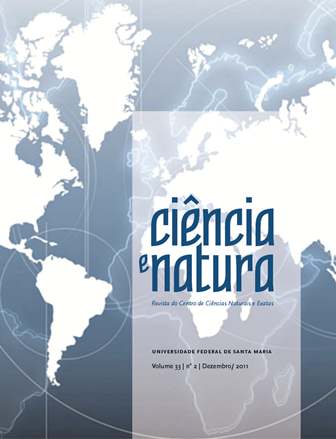Análise das Pressuposições e Adequação dos Resíduos em Modelo de Regressão Linear para Individuais, Ponderados e não Ponderados, utilizando Procedimentos do SAS®
DOI:
https://doi.org/10.5902/2179460X9359Abstract
It is appropriate to use regression analysis establish relations that allowto predict tone or more variables in terms of others. When there arerepeated measurements for independent variable X for differentmeasurements for dependent variable Y, the regression model may beadjusted in three different ways: using individual values of X and Y(considering all data); with means of Y for levels of X (treatments) and,using weighted means of Y by the number of repetitions of each level ofX (treatment). The objective of this study is to adjust a linear regressionmodel by individual values with weighted and not weighted means ofthe treatments in order to test the presuppositions for the adequacy ofthe model and to analyze the variance decomposing the sum of squaresof error in its components, thus evaluating the Lack of Fit. Theadjustments of the models and its presuppositions were done in SAS.Thus, it was observed that the adjusted models for individual data andweighted means present the same coefficients. The test for Lack of Fit isonly possible with individual data. The choice of best strategy to analyzethe data should be decided by the researcher but it is suggested that,when all data of the research are accessible, the best strategy would beto estimate the model using individualized data since it presents moreprecise information regarding the variability of the data set which doesnot happen when working with means of variables.Downloads
Downloads
Published
How to Cite
Issue
Section
License
To access the DECLARATION AND TRANSFER OF COPYRIGHT AUTHOR’S DECLARATION AND COPYRIGHT LICENSE click here.
Ethical Guidelines for Journal Publication
The Ciência e Natura journal is committed to ensuring ethics in publication and quality of articles.
Conformance to standards of ethical behavior is therefore expected of all parties involved: Authors, Editors, Reviewers, and the Publisher.
In particular,
Authors: Authors should present an objective discussion of the significance of research work as well as sufficient detail and references to permit others to replicate the experiments. Fraudulent or knowingly inaccurate statements constitute unethical behavior and are unacceptable. Review Articles should also be objective, comprehensive, and accurate accounts of the state of the art. The Authors should ensure that their work is entirely original works, and if the work and/or words of others have been used, this has been appropriately acknowledged. Plagiarism in all its forms constitutes unethical publishing behavior and is unacceptable. Submitting the same manuscript to more than one journal concurrently constitutes unethical publishing behavior and is unacceptable. Authors should not submit articles describing essentially the same research to more than one journal. The corresponding Author should ensure that there is a full consensus of all Co-authors in approving the final version of the paper and its submission for publication.
Editors: Editors should evaluate manuscripts exclusively on the basis of their academic merit. An Editor must not use unpublished information in the editor's own research without the express written consent of the Author. Editors should take reasonable responsive measures when ethical complaints have been presented concerning a submitted manuscript or published paper.
Reviewers: Any manuscripts received for review must be treated as confidential documents. Privileged information or ideas obtained through peer review must be kept confidential and not used for personal advantage. Reviewers should be conducted objectively, and observations should be formulated clearly with supporting arguments, so that Authors can use them for improving the paper. Any selected Reviewer who feels unqualified to review the research reported in a manuscript or knows that its prompt review will be impossible should notify the Editor and excuse himself from the review process. Reviewers should not consider manuscripts in which they have conflicts of interest resulting from competitive, collaborative, or other relationships or connections with any of the authors, companies, or institutions connected to the papers.







